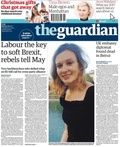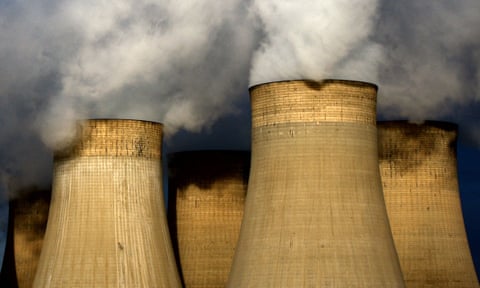Top story: Savers get ‘clear say’ on where money is invested
Good morning. I’m Martin Farrer and this is the Guardian’s morning briefing.
Campaigners against fossil fuels have claimed a major victory after the government agreed to allow Britain’s £2 trillion workplace pension schemes to dump their shares in oil, gas and coal companies more easily. In an exclusive story, our money editor Patrick Collinson says new regulations set to be introduced by ministers mean fund managers will be able to mirror members’ ethical concerns and address environmental problems. They overturn fiduciary duties that required schemes to seek the best returns irrespective of the threat of climate change. Catherine Howarth of campaign group ShareAction said the move was a “welcome breakthrough” which followed years of campaigning. Guy Opperman, the minister for pensions and financial inclusion, said savers would have “the clear opportunity to have their say on where their money is invested and can reflect what is personally important to them”. The rules are expected to come into force next year.
Brexit rebel call – The Tory rebels who voted against the government last week have been emboldened by their success and are urging Theresa May to enlist Labour MPs to fashion a cross-party alliance for a soft Brexit. As the prime minister and her senior ministers meet today to thrash out the shape of Britain’s post-Brexit relations with the EU, the dissident Tories believe she could persuade opposition members to back a push for a closer future relationship with Brussels. But she must do so quickly, they say, before Jeremy Corbyn firms up his policies and prevents his MPs from backing the government. One said that if she was clever, May could “go to those sensible Labour people and put the hard Brexiters back in their box”. The full cabinet, which is divided over Brexit, meets to discuss its strategy tomorrow.
Writing in the Guardian, Dominic Grieve, the former attorney general and leading rebel, says the fomenting of hatred in the wake of last week’s vote – which he blames in part on the pro-Brexit press – “undermines the ability of politicians to engage in rational debate”.
The publisher who launched the Harry Potter franchise has warned of another unintended Brexit consequence. Nigel Newton, the chief executive of Bloomsbury, says that British publishers benefit financially from the English-language rights to books published in the EU but, post-Brexit, rivals in America could muscle in, meaning less risk-taking and therefore fewer openings for new writers.
Diplomat found dead – Police in Beirut will today continue their investigation into the death of British diplomat Rebecca Dykes, whose body was found at the side of a road in the Lebanese capital on Saturday morning. Details about her death are still unclear but local police officials have suggested she was strangled. Dykes, 30, a policy manager with the Libya team at the Foreign Office, had been out with colleagues in the city’s Gemmayze district on Friday night. She is thought to have left on her own at around midnight.

Spoty surprise – Sir Mo Farah’s victories aren’t usually a surprise, but Britain’s greatest track Olympian shocked everyone last night – including himself – by winning the BBC’s Sports Personality of the Year award. Farah, whose four Olympic golds have been overshadowed by an anti-doping investigation into his former coach, was not at the ceremony in Liverpool. Instead he was presented the prize – known as Spoty – via videolink which promptly collapsed and viewers initially missed his surprised reaction. The boxer Anthony Joshua had been favourite to win but he ended up fourth behind Farah and Paralympic sprinter Jonnie Peacock and Superbikes rider Jonathan Rea. Our sports writer Sean Ingle says it is a sign that the British public has finally taken Farah to their hearts.
Airport chaos – More than 1,000 flights have been cancelled after a power cut brought the world’s busiest airport to a standstill. Passengers at Hartsfield-Jackson airport in Atlanta were left stranded when a fire damaged the hub’s electrical system at about 1pm local time on Sunday. All outgoing flights were stopped and incoming planes were held at point of departure. International flights were diverted. Closer to home, a one-day strike planned by Ryanair pilots on Wednesday has been suspended after their union agreed to meet management for talks about their dispute over representation tomorrow.
Cheesed off – What is it about Britain and Christmas? There was the Lapland New Forest wonderland that turned out to be anything but. Now there’s a festive stink about the The Giant Cheese Board event in London which promised all-you-can-eat cheese, plus mulled wine and helpers dresed as giant mice to guide you round. Some festival-goers reported feeling short-changed with one describing “plates of chopped up British cheeses, mostly hard, some caterers packs of chutney, no Camembert (baked or not), queues for cold and very sweet ‘low alcohol’ mulled wine”. The organisers denied the accusations but did acknowledge that the halloumi burger and camembert chef had fallen ill the night before.
Lunchtime read: Melancholy and the battle of the sexes

It was a bestselling cult classic and its admirers have included John Keats, Samuel Beckett, Philip Pullman and Cy Twombly. But while Robert Burton’s eccentric masterpiece The Anatomy of Melancholy might not feature on many household bookshelves these days, back in the 17th century it was a sensation. The “often exasperating, but strangely addictive” 1,400-page tome is the latest entry in Robert McCrum’s magisterial assessment of the 100 best non-fiction books of all time. Although it is ostensibly a medical text on the condition of the human mind, McCrum says the book also acts as “an offbeat, encyclopedic, stream-of-consciousness meditation on the mysteries of existence”. Burton, who also opines freely on the battle of the sexes, finds melancholy ingrained in the human condition, calling it “an inbred malady in every one of us”. Discuss.
Sport
England’s Ashes fate has been delayed by leaky covers at the Waca in Perth overnight although play has resumed and Jonny Bairstow and Moeen Ali are already out. Follow the action at our live blog.
Back-to-back defeats for Leicester and Saracens on Sunday completed another disappointing weekend for English clubs in Europe with the Premiership sides now staring down the barrel of their worst continental campaign in six seasons. Pep Guardiola will discuss a new contract with Manchester City in the summer, while Liverpool’s Alex Oxlade-Chamberlain described team-mate Philippe Coutinho as “the most professional person I’ve seen all season” after the playmaker dazzled in a 4-0 victory at Bournemouth. Meanwhile, migrant workers constructing stadiums for the Qatar 2022 World Cup continue to be trapped in a vicious cycle of debt and exploitation, according to new research by Amnesty International.
Business
Shares in Asia rose strongly overnight in anticipation that US lawmakers will approve Donald Trump’s tax reforms. The Nikkei led the pack with a rise of 1.5%.
The FTSE100 is expected to open up by a more modest 0.2%, while the pound is buying $1.333 and €1.134.
The papers
Rebecca Dykes, the British diplomat found dead in Beirut, features on many front pages, with the Mirror and Metro leading with the suspected murder. “Brit embassy girl is murdered”, says the former’s banner heading.
The Mail goes with “Middle class pension crisis” and says 12 million workers are under-saving for retirement, according to government figures. The FT splashes on the same story under the headline “Millennials and gig economy left behind by pension reforms”.

The Guardian leads on calls for Theresa May to tap Labour MPs for support for a soft Brexit while the Times says that senior Conservatives are telling the PM to delay her departure from No 10 to avoid Brexit chaos: “Tories urge May to stay until 2021”.
The Telegraph says international development secretary Penny Mordaunt has told Saudi Arabia it must allow aid through to starving people in Yemen.
Finally, the Express has the gloomy festive forecast that wild weather could disrupt Christmas with “70mph storm chaos on way”.
For more news: www.theguardian.com
Sign up
The Guardian morning briefing is delivered to thousands of inboxes bright and early every weekday. If you are not already receiving it by email, you can sign up here.
